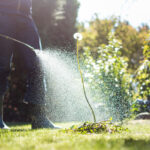NEW study links glyphosate exposure to oxidative stress and development of cancer
 (NaturalHealth365) In the latest episode of the environmental toxins saga, newly-published research adds to “the weight of evidence,” showing a link between one of the world’s most popular (and controversial) herbicides and a process in the human body that can cause cancer.
(NaturalHealth365) In the latest episode of the environmental toxins saga, newly-published research adds to “the weight of evidence,” showing a link between one of the world’s most popular (and controversial) herbicides and a process in the human body that can cause cancer.
The herbicidal compound – glyphosate – is a key ingredient in the commercial weedkiller Roundup, which is currently used within the farming and agricultural industry. But as more and more data piles up about the human health harms associated with this product, one can only hope that regulators at the Environmental Protection Agency (EPA) and elsewhere will continue to push for updated assessments and safety requirements surrounding this concerning toxin.
New study supports concern that popular herbicide induces physiological changes in the human body that causes cancer
Published in the latest volume of the Journal of the National Cancer Institute, the study was conducted by ten scientists affiliated with the National Institutes of Health and two scientists from the Centers for Disease Control and Prevention (CDC). For their study, the researchers collected data from 268 male farmers belonging to a cohort of another ongoing, government-funded study (the Agricultural Health Study) and compared these farmers to 100 age-and geography-matched male, nonfarming controls.
The researchers analyzed the relationship between study participants’ history of glyphosate exposure to levels of biomarkers in their urine that can indicate oxidative stress. As a reminder, oxidative stress is a type of cellular damage in the body that can alter and damage DNA and ultimately lead to cancer. As the authors note, “The International Agency for Research on Cancer identified oxidative stress as a key characteristic of carcinogens, and accumulating evidence supports the role of oxidative stress in the pathogenesis of hematologic cancers.” Examples of hematologic or blood-related cancers include lymphoma, myeloma, and leukemia.
The thing is, even though we have ample evidence among animal and in vitro models that glyphosate exposure increases the risk of certain cancers, “evidence in human populations remains scarce.” But not only did the authors in this study add to the growing body of literature warning of a link between glyphosate and cancer, but they also managed to offer a possible mechanism as to why this association exists.
In short, the scientists found that farmers who reported greater levels of exposure to glyphosate had significantly higher levels of oxidative stress biomarkers in their urine. One can infer from this evidence that having higher levels of oxidative stress in the body will ultimately increase a person’s risk of cancer.
The authors ultimately conclude that their data supports an “association between glyphosate exposure and oxidative stress in humans and may inform evaluations of the carcinogenic potential of this herbicide.”
Glyphosate: Truly a global concern
Even though the study was done specifically on farmers who work directly with glyphosate, others in the public may be at risk, too, warn the study authors.
They write that “these effects may apply more broadly to the general population who are primarily exposed through ingestion of contaminated food and water or residential applications.”
Remember, there are ways to reduce your family’s exposure to potentially harmful toxins like glyphosate. According to research shared by Consumer Reports, for example, one of the best things you can do is to buy and consume organic foods.
Can’t fit an all-organic grocery list into your budget? Don’t stress. Even choosing some organic products has been shown in studies to reduce a person’s pesticide exposure. In addition, there’s always the option of finding a local farmer that avoids the use of chemicals (to save money on grocery items) and/or starting your own vegetable garden, if possible.
Editor’s note: If you’re interested in learning more about Jonathan’s “food garden” tips and videos … let us know in the comment section below.
Sources for this article include:
Organicconsumers.org
Substack.com
Academic.oup.com
Consumerreports.org



